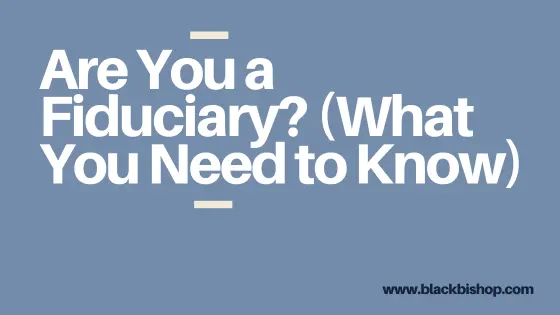The term “Fiduciary” comes from the Latin word “fiducia” which means trust.
In 401(k) terms, a fiduciary is someone entrusted with complying with the requirements outlined in ERISA—the Employee Retirement Income Security Act of 1974. This act governs the management and operation of retirement plans and protects the interests of those invested in the plan.
Who is a Fiduciary?
According to ERISA, a fiduciary is anyone who:
- Exercises any discretionary authority over the management of the plan or the management or disposition of plan assets.
- Provides or has the responsibility or authority to provide investment advice for a direct or indirect fee or other compensation.
- Has discretionary authority or discretionary responsibility related to the administration of the plan.
Certain positions are always considered fiduciaries, such as the plan sponsor and the plan trustees.
Additional fiduciaries may be specifically listed in the plan document by name or title.
ERISA’s definition of fiduciary, however, is a functional one. So, this means anyone who acts in a fiduciary role is considered a fiduciary. (For example, whoever selects investments for the plan is a fiduciary, whether or not that person is formally assigned that responsibility.)
If the plan administration and investments are overseen by a committee, then by law, the committee members, as well as the board of directors that appoints them, are fiduciaries (if they have voting rights on the committee). In the absence of a committee, company officers making decisions about the plan are fiduciaries.
What Is the Significance of Being a Fiduciary?
Fiduciaries have important responsibilities and are subject to standards of conduct because they act on behalf of participants in a retirement plan and their beneficiaries. These responsibilities include:
- Acting solely in the interest of plan participants and their beneficiaries and with the exclusive purpose of providing benefits to them;
- Carrying out their duties prudently;
- Following the plan documents (unless inconsistent with ERISA);
- Diversifying plan investments; and
- Paying only reasonable plan expenses.
With these fiduciary responsibilities, there is also potential liability. Fiduciaries who don’t follow the basic standards of conduct may be personally liable to restore any losses to the plan, or to restore any profits made through improper use of the plan’s assets resulting from their actions.
Limiting Liability
So, what are some of the ways fiduciaries can limit their personal liability?
- They can (and should) document the processes used to carry out their fiduciary responsibilities (documenting all decisions made and the research/reasons to support those decisions).
- Give participants control over the investments in their account by meeting the provisions of ERISA Section 404(c). Contact us for a free 404(c) checklist if interested in learning more.
- Hire service providers to handle some fiduciary functions.
Not Sure if You’re a Fiduciary?
We’ve put together a simple questionnaire to help you identify if you are (and who else might be) a plan fiduciary. Simply contact us and we’d be happy to send you our “Am I A Fiduciary” questionnaire.
If you already know you are a fiduciary and want help meeting your fiduciary obligations, feel free to contact us and we can set up a no-obligation call to discuss your plan.



